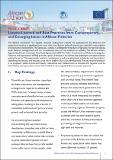Lessons Learned and Best Practices from Contemporary and Emerging Issues in African Fisheries

(en=English; ar=Arabic; fr=French; pt=Portuguese)
Language
enDate
2023-01-01Author
AU-IBAR
Type
Policy BriefItem Usage Stats
211
views
views
39
downloads
downloads
Abstract
The African continent’s rich aquatic resource endowment creates the potential for the fisheries and
aquaculture sectors to significantly increase their contribution to food security, per capita fish consumption
and economic development. The sector, as a whole, is underperforming due to high post-harvest fish losses,
weak fisheries management, and the undeveloped state of the aquaculture industry. The African Union’s
Agenda 63, African Continent Free Trade Agreement (AfCTA), Policy Framework and Reform Strategy for
Fisheries and Aquaculture (PFRS) provide a policy framework to address the challenges and opportunities
within the sector. This policy brief considers contemporary and emerging issues in fisheries and aquaculture,
identifying key lessons and best practices which enable value chain development. The key recommendation
is to empower public-private-community institutions and collaboration at national and regional level to
build fishery and aquaculture value chains based on an integrated ‘blue economy’ approach.
Description
The African continent’s rich aquatic resource endowment creates the potential for the fisheries and
aquaculture sectors to significantly increase their contribution to food security, per capita fish consumption
and economic development. The sector, as a whole, is underperforming due to high post-harvest fish losses,
weak fisheries management, and the undeveloped state of the aquaculture industry. The African Union’s
Agenda 63, African Continent Free Trade Agreement (AfCTA), Policy Framework and Reform Strategy for
Fisheries and Aquaculture (PFRS) provide a policy framework to address the challenges and opportunities
within the sector. This policy brief considers contemporary and emerging issues in fisheries and aquaculture,
identifying key lessons and best practices which enable value chain development. The key recommendation
is to empower public-private-community institutions and collaboration at national and regional level to
build fishery and aquaculture value chains based on an integrated ‘blue economy’ approach.